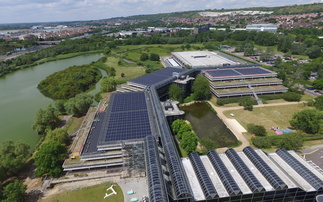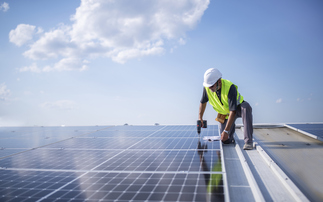More than 150 businesses call on government to revisit proposals to halt solar farm subsidies
More than 150 businesses in the solar sector will today deliver a letter to Number 10 Downing Street, calling on the government to reconsider its proposed changes to subsidies which developers fear will result in the solar farm industry grinding to a halt next year.
The letter, signed by a host of high-profile firms including Ikea, Triodos Bank and Ecotricity, urges David Cameron to overrule the Department of Energy and Climate Change's (DECC) proposals to halt Renewables Obligation (RO) support for large solar farms with above 5MW of capacity from April 2015.
A consultation on the proposals closes today and is designed to put the brakes on the rapid growth of the ground-mounted solar market, in a move designed to refocus investment toward rooftop schemes.
The government maintains that it has been instrumental in driving record levels of solar deployment during this parliament and that the proposed changes to subsidies are necessary to ensure that the budget for clean energy support is not breached. Ministers have also hinted that a failure to curb solar farm development could see the sector face similar levels of local opposition to that experienced by some wind farm projects.
However, solar businesses and green NGOs have countered that the proposed changes will effectively kill off a growing and increasingly cost-effective source of clean energy that enjoys high levels of public support. As such green groups and solar firms have called on Ministers to reconsider the proposed changes and deliver a compromise proposal that could trim support for solar farms without killing off the development pipeline.
Today's letter argues that in their current form the proposed changes will fail to boost the rooftop market and will cause an investment hiatus for the solar farm sector. As such it calls on DECC to publish a brand new consultation featuring proposals that could help unlock the rooftop market, while still ensuring the clean energy budget, known as the Levy Control Framework (LCF), is adequately protected.
The Solar Trade Association has dismissed the government's argument that new large-scale solar developments could blow the LCF budget, as the technology accounts for just five per cent of expenditure under the RO scheme.
It argues that if the government reduced support for solar farms under the RO to lower levels, rather than halting it all together, it would allow the industry to continue to deploy at a steady, albeit slower rate, driving down costs and increasing competition across the energy market.
The government has said solar farm developers will still be able to access support through the new contract for difference (CfD) mechanism from next year. But industry insiders have warned that the CfD is better tailored for large-scale energy companies, than it is for the smaller developers who typically deliver solar projects. There are also concerns that the requirement for solar farms to bid for support under the CfD through an auction process will further undermine investor confidence in the market.
Solar Trade Association chief executive Paul Barwell said the proposals would derail the development of the industry just as it is starting to enjoy some success.
"So serious are the implications of these consultations for the British solar industry that we are asking the Prime Minister to overrule the Department for Energy and Climate Change," he said. "We only need one more push, one more period of policy stability to be able to compete with fossil fuels without support. That is the global race the PM needs to win for the UK economy and the climate."
The end of the consultation comes as Climate Change Minister Greg Barker engaged late last week in a Twitter spat with leading environmental campaigner Jonathon Porritt, after the former chair of the Sustainable Development Commission accused the government of deliberately trying to kill the solar sector with its proposed changes to the subsidy regime.
In an open letter to Barker and Energy and Climate Change Secretary Ed Davey entitled "Why do Ed and Greg hate solar energy?", Porritt called on them to explain why they are "about to shaft the UK's solar industry all over again, at exactly the point where it's beginning to make a substantive contribution to this country's energy needs, generating significant economic benefits, with strong support from the general public."
In response, Barker took to Twitter to describe the blog post as "the most pompous doom laden load of drivel i have read for ages. #CheerUp". He then added: "just how much #solar went on line during all those years you were on the government pay roll?"
@jonathonporritt Stop talking the #solar industry down. Even you can't argue with this data..... of course you will! pic.twitter.com/oGbwpLZsIU
— Greg Barker (@GregBarkerMP) July 4, 2014
But Friends of the Earth's renewable energy campaigner Alasdair Cameron said ministers should rethink their plans.
"Ministers are yet again failing to walk the walk on Britain's solar potential," he said. "They say their plans are ambitious, yet this proposal attacks solar parks while doing almost nothing to boost large rooftop systems. The solar industry has made phenomenal progress in recent years: solar power is already cheaper than new nuclear, could soon be less expensive than gas, and can be installed safely and discreetly in the heart of our communities. Ministers must recognise solar's huge potential and ensure that everyone has the opportunity to plug in to the sun - starting with our schools."
The development came amid some confusion over the government's plans to boost solar installations on schools, after Friends of the Earth distanced itself from government claims that the NGO would be working with ministers on a new campaign to promote solar schools installations.







